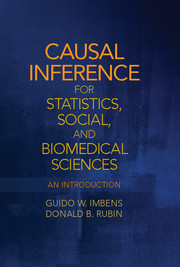Book contents
- Frontmatter
- Dedication
- Contents
- Preface
- PART I INTRODUCTION
- PART II CLASSICAL RANDOMIZED EXPERIMENTS
- PART III REGULAR ASSIGNMENT MECHANISMS: DESIGN
- PART IV REGULAR ASSIGNMENT MECHANISMS: ANALYSIS
- 17 Subclassification on the Propensity Score
- 18 Matching Estimators
- 19 A General Method for Estimating Sampling Variances for Standard Estimators for Average Causal Effects
- 20 Inference for General Causal Estimands
- PART V PRGULAR ASSIGNMENT MECHANISMS:SUPPLEMENTARY ANALYSES
- PART VI REGULAR ASSIGNMENT MECHANISMS WITH NONCOMPLIANCE: ANALYSIS
- PART VII CONCLUSION
- References
- Author Index
- Subject Index
19 - A General Method for Estimating Sampling Variances for Standard Estimators for Average Causal Effects
from PART IV - REGULAR ASSIGNMENT MECHANISMS: ANALYSIS
Published online by Cambridge University Press: 05 May 2015
- Frontmatter
- Dedication
- Contents
- Preface
- PART I INTRODUCTION
- PART II CLASSICAL RANDOMIZED EXPERIMENTS
- PART III REGULAR ASSIGNMENT MECHANISMS: DESIGN
- PART IV REGULAR ASSIGNMENT MECHANISMS: ANALYSIS
- 17 Subclassification on the Propensity Score
- 18 Matching Estimators
- 19 A General Method for Estimating Sampling Variances for Standard Estimators for Average Causal Effects
- 20 Inference for General Causal Estimands
- PART V PRGULAR ASSIGNMENT MECHANISMS:SUPPLEMENTARY ANALYSES
- PART VI REGULAR ASSIGNMENT MECHANISMS WITH NONCOMPLIANCE: ANALYSIS
- PART VII CONCLUSION
- References
- Author Index
- Subject Index
Summary
INTRODUCTION
In Chapters 17 and 18, two general frequentist approaches for estimating causal effects were discussed, with special focus on estimating average causal effects. In order to conduct inference in those settings, it is important to have methods for estimating sampling variances so that we can construct large-sample confidence intervals. In the current chapter we discuss such methods. In doing so, a number of issues arise.
The first issue we raise concerns the choice of estimand. If we are interested in the average effect of the treatment, we need to be explicit about whether we are interested in the average effect in the sample, or in the average effect in the super-population from which the sample is hypothetically randomly drawn. Although this choice is generally immaterial for the estimation of causal effects, the associated sampling variances generally differ, even in large samples, and so will the corresponding estimators for the sampling variances, at least in settings allowing for heterogeneity in the causal effects. Thus, in such settings, the researcher faces a choice regarding the estimand and the estimator for the associated sampling variance.
Second, we face the choice as to whether we should construct estimators for the sampling variance tied to the specific method for estimating the average treatment effects or estimators that apply more generally. In the current chapter we emphasize the second approach, exploiting some of the properties shared by most standard estimators for aver- age causal effects, and develop a general method for estimating sampling variances for such estimators. A key insight is that nearly all the estimators discussed in the previous chapters, as well as most others proposed in the literature, have a common structure. These estimators can be written as the difference between two terms, both weighted averages of observed outcomes. The first term is a weighted average of the observed out-comes for the treated units, and the second term is a weighted average of the observed outcomes for control units.
Information
- Type
- Chapter
- Information
- Causal Inference for Statistics, Social, and Biomedical SciencesAn Introduction, pp. 433 - 460Publisher: Cambridge University PressPrint publication year: 2015
